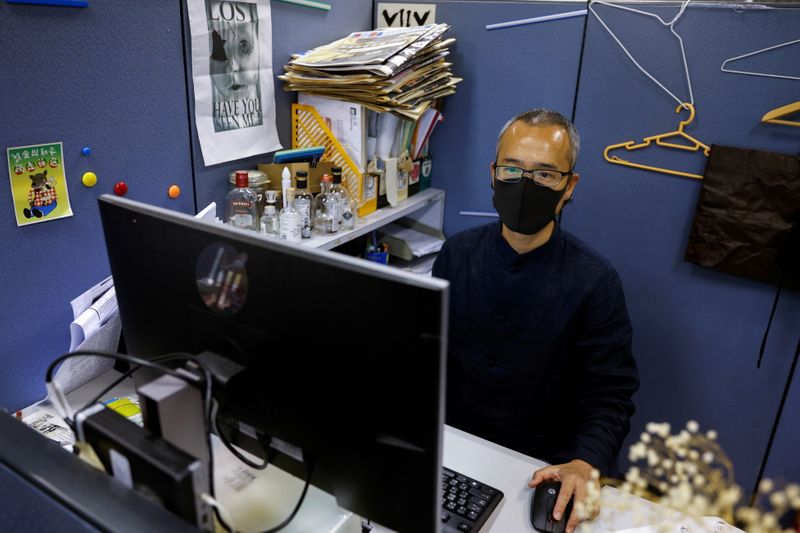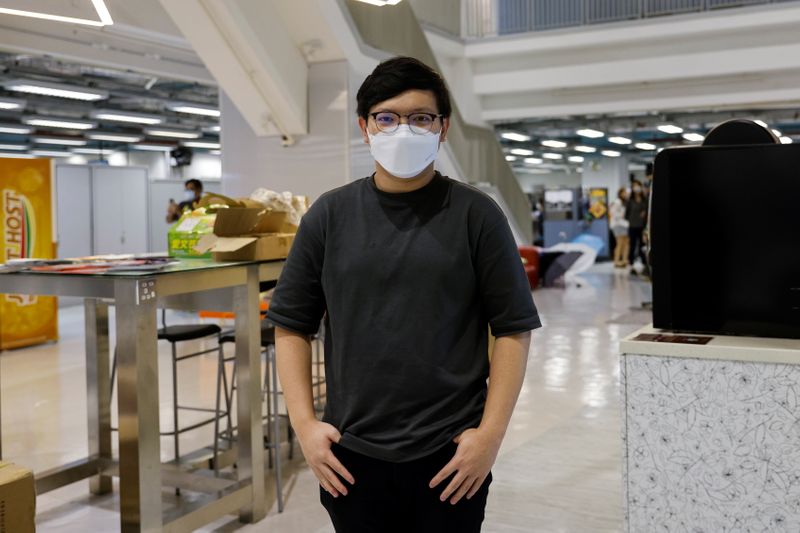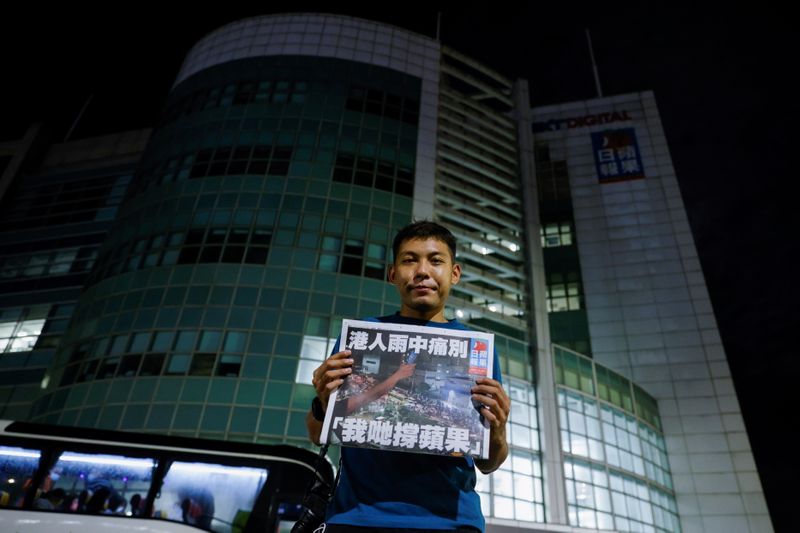HONG KONG (Reuters) – Apple Daily cub reporter Yau Ting-leung could not sleep much. Tired, he lay in bed on Wednesday morning checking the news.
The 23-year-old had been in his dream job at the pro-democracy tabloid for less than a year, but now things were unravelling.
Six days after a police raid on Apple, the arrests of its top two editors and a freeze of core assets on national security grounds, the company was running out of cash and options.
Final publication was set for Saturday, with a skeleton crew putting out the last of the roughly 9,500 editions of the paper.
“At 11:30 a.m. the news came that they’d arrested our lead columnist,” Yau told Reuters. “At that moment, I just felt numb.”
Soon afterward, the board decided it would be the last day for the feisty Chinese-language publication that combined celebrity gossip with investigations of the powerful.
Yau, the youngest member of the paper’s investigative team, ignored a warning from management to stay home, showing up at the office in an isolated industrial estate. Many others did the same.
With Apple’s website and 26 years’ worth of content to be purged at midnight, time was running out.
“I didn’t have to write anything today. I was put in charge of saving our work, including our award-winning reports,” said Yau, who is three years younger than Apple Daily. But he was unable to finish: “No matter how hard I tried to back up … there just wasn’t enough time.”
Ten metres from Yau, Norman Choi was at work on a story. This time, though, it was an obituary for Apple Daily.
Surrounded by the clutter of 22 years at the paper, including crackers and empty liquor bottles, the 51-year-old senior features editor clacked away at his keyboard, wearing a black mask and clothes.
As he tried to focus, Choi had a mountain of other tasks, such as taking down slogans beside his desk.
“I’m not deliberately staying behind. I just don’t want to leave my fellow reporters,” he said.
Deputy chief editor Chan Pui-man, out on bail after her arrest, wandered the open-plan newsroom with its “I love Apple” logos on the wall, red-eyed at times.
“It’s hard to control our emotions,” she said.
APPLE TREE
As news of the paper’s impending closure spread, staff could see and hear crowds gathering outside. Some chanted “Thank you Apple Daily – Add oil!” a Chinese expression of encouragement that had become a refrain among supporters of the paper.
Around midnight, the first warm copies of the record 1 million to be printed – more than 10 times the usual press run – came off the presses and were handed out to the cheering crowd.
Ryan Law, 47, Apple Daily’s editor-in-chief, told Reuters before his arrest, “No matter what happens to us, you can’t kill the people who read Apple Daily.”
Photographer Harry Long, and his pictures team did not have to venture far for their last front-page image.
They settled on a shot from the roof showing the people, many with umbrellas, and vehicles clogging the normally quiet street below. Beside the picture, the headline read: “Hong Kongers bid a painful farewell in the rain.”
Lights from mobile phones twinkle up from the supporters.
“I’m heartbroken,” Long said.
Yau waved down from the roof with his own mobile phone, hugging colleagues soon to be out of a job.
“We would all suddenly start crying as we just couldn’t bear to see this end,” he said. But at the same time, “everyone was happy too. That we could all work through this last day together, united in doing this one thing.”
Choi, the features editor, found the public support touching.
“It’s the first time so many readers come and support us here, and I know it’s the last time,” he said. Their showing up “means everything in my career in Apple Daily, and in my life.”
Papers were stacked and loaded onto lorries and vans and whisked to newsstands across the city of 7.5 million.
At a kiosk in the working class district of Mong Kok, hundreds queued around the block to snap up a copy. Some chanted “Liberate Hong Kong – Revolution of our Times,” the rallying cry of the city’s mass anti-China protests in 2019.
The last edition carried a farewell letter from Chan, the deputy chief editor.
“When an apple is buried beneath the soil, its seed will become a tree filled with bigger and more beautiful apples.
“Love you all forever, love Hong Kong forever.”
(Reporting by James Pomfret, Jessie Pang, Tyrone Siu, Joyce Zhou and Sharon Abratique; Editing by William Mallard)























